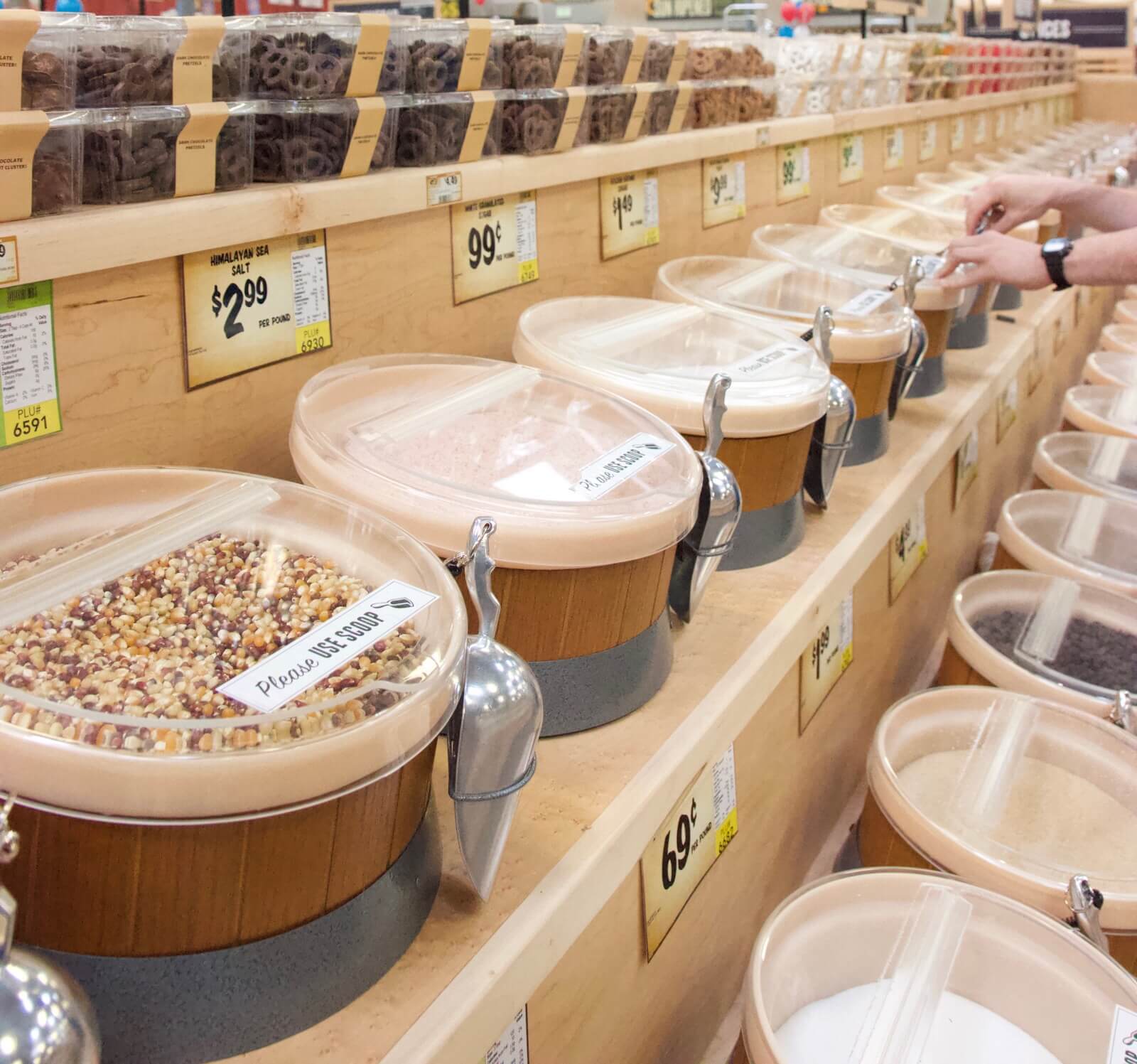
Part 3 – Navigating The Grocery Store
By Kait Spielmaker
Food packaging is one of the toughest obstacles to overcome when going zero waste. As much as I would love to be my own Martha Stewart, our kitchen is smaller than your average cubicle. I also work and go to school full-time, which poses a challenge for the part of me that wants to spend the time making my own bread and yogurt from scratch. Therefore, I have to rely on the local grocery options.
Grocery shopping
I’m fortunate to live in a big city with an abundance of grocery stores and farmers’ markets. Over the last few months, I have adopted many mason jars and reusable containers to use in the bulk section at Sprouts or for frequenting the Uptown Market on Saturday mornings.
If your grocery store offers a bulk section, be sure to weigh the containers in advance using the self weigh machines or at the front with a cashier. At checkout, the cashier will deduct that amount, leaving you to only pay for the product, not the containers. Buying in bulk has become my new best friend. My coffee beans, grains, produce, nuts, cooking supplies like flour, and even honey now come to my apartment without the plastic packaging.
This is great progress, but I’m not perfect. I bought one of those plastic packs of lettuce yesterday. Even if you have found a way to get a product using a non-plastic substitute, sometimes convenience wins. These little setbacks are going to happen, leaving the feeling of frustration. The key is not to be too hard on yourself. The end goal is swapping as much plastic for reusables as possible. It seems each week I learn new tips and tricks and it is definitely not about being perfect. This journey is about making a conscious effort to be better for your future self and the future of those around you. If every person committed to omitting even a small portion of their plastic consumption, there would be a monumental impact.
Tips For Greening Your Grocery Trip
Whether you reside in a big city or small town, you can cut down your plastic packaging at the grocery store.
- Buy in bulk when possible (coffee, flour, etc.), or if bulk is not available, strive for large containers. This way items are being bought less frequently, creating less waste. This works great for items with extended shelf life like peanut butter, flour, and nuts.
- When applicable, try to buy products in glass containers over plastic. There are arguments on which is better but in my research, I have found that glass has a higher recycling rate compared to all the different plastics that exist. Plus glass jars are easy to keep and reuse around the house for different things.
- Please don’t put your produce in plastic bags. Instead, purchase six cotton produce bags on Amazon or essentially anywhere, usually for under $20, and they are 100% reusable.
As a disclaimer, these ideas are not unique. There are tons of articles and blogs that exist on zero waste and finding ways to live more efficiently. Everyone does it in their own way; this is my way. I research recipes and low-waste tips to fit into my routine. There are websites like Litterless that list all the zero-waste grocery stores by state.
Do your own research for things that are best suited for you. This rapidly growing waste problem can only be solved when people come together, learn from one another, and ultimately grow into a new lifestyle together.
Let Your Voice Be Heard
If you have a grocery store that you love (for me it’s Trader Joe’s) that’s not being responsible, tell them. I used to shop primarily at Trader Joe’s because their selection is, in my opinion, unmatched. But when I decided to make the switch to minimal waste, Trader Joe’s became basically impossible because of their packaging. I wrote to them and told them I was disappointed in their packaging and indifference toward their impact. Within two months, they released a statement saying they were phasing out all their plastic packaging over the next year and committing to a more conscious way of doing business. I know that my strongly worded email wasn’t what made them change, but I like to think it helped.
Essentials For Going Waste-Free (Or Close To It) At The Grocery Store
- Reusable grocery bags
- Produce bags
- Reusable plastic or glass containers for grains, coffee, nuts, flour, granola, etc.
- Time
Find previous articles in this series by following the links below:
https://greenlivingmag.com/a-personal-journey-in-environmental-responsibility/
https://greenlivingmag.com/environmental-household-alternatives/
https://greenlivingmag.com/reduce-waste-grocery-trips/
Kait is a Michigan native who relocated to Phoenix and is the administrative coordinator at
Green Living Magazine. She is an avid hiker and is working on her master’s degree in Sustainable Tourism at Arizona State University.
Photo by Kait Spielmaker






